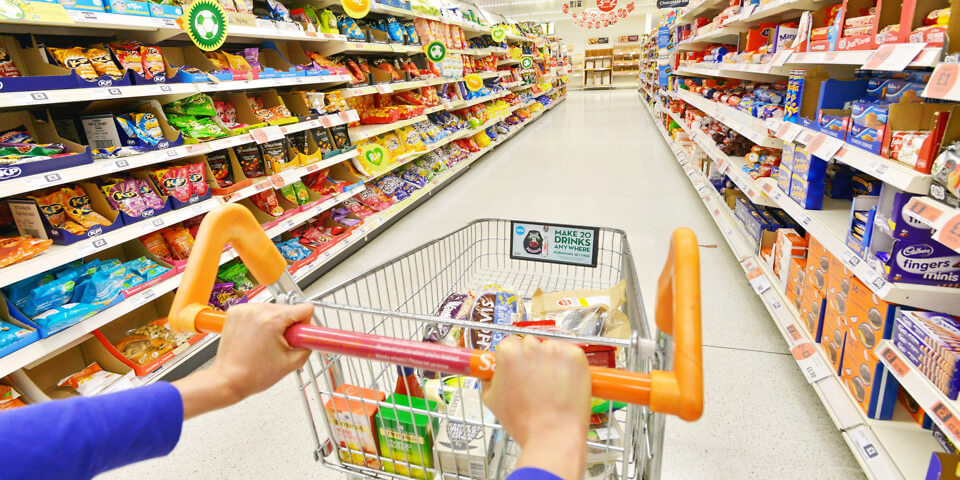So you popped into your local supermarket to pick up this week’s essentials – the milk, bread, eggs and veggies. Ten minutes in, and the trolley shows your good intentions. But thirty minutes later you’re leaving with ready meals, crisps and biscuits. How did that happen?
Like someone on Derren Brown’s TV shows, you’ve been hypnotised. Or at least unwittingly hooked into buying more of the shop’s most profitable products. We can respect their cleverness. But next time, prepare yourself for the tricks of their trade. Otherwise these choices will be fattening you up – without your permission.
In this blog, we look into this ‘supermarket trickery’ in more detail. We look at some of its consequences. Most importantly, we give you a list of five tips to help you steer clear of the processed, sugary foods that can end up in your trolley. With a bit of forward thinking, you can get the best from your local supermarket and avoid the junk.
We can resist anything except temptation
On average, shoppers in the UK make over 200 trips to the supermarket every year. That repetition means that we often buy things on autopilot. We behave in ways we’re not even conscious of.
All those trips mean opportunities to impulse-buy unhealthy food. As a result, one in five adults say supermarkets send them off-track when they try to lose weight. Here are some reasons why:
- Shopping trolleys are bigger than they’ve ever been. That appeals to the part of our caveman brain that likes to do a little hoarding.
- Fruit and veg are nearly always located at the front, and you feel virtuous when you choose them. But later, in front of the crisps and sweets, you’re more likely to treat yourself.
- The healthy food choices are rarely at eye level. You need to do some bending and reaching to hunt them down.
- Despite being staples for most shoppers, eggs and bread are often at the back of the store. You have to pass lots of tempting special offers to get to them.
- We’re heavily influenced by these special offers and promotions, such as ‘buy one get one free’. According to Cancer Research UK, nearly a third of food and drink is bought this way. Bargain-loving shoppers are typically less healthy, as they buy 30% less fruit and 25% percent fewer vegetables.
- Even our love for music can be used to nudge our behaviour. One study showed that slow music makes us feel less rushed. Playing French music led to French wine outselling German wine, and vice versa.
Those are just some of our supermarket challenges. To beat them, it’s wise to educate yourself and have a plan. Reflect on the shop layout on your next visit, and how you behave. Then practise your tactics next time you go. Here are some good places to start:
On every visit, know what you need
When you arrive, you’re about to be bombarded with choice. So get the blinkers on. If you have a list, find those items before you do anything else. The leeks and onions you came in for don’t need a basket of treats for company. A list written earlier in the day also offers an extra way of keeping you on track. You can use it to write a little note to your future self: ‘Put down the chocolate digestives.’
With or without a list, I use an acronym to keep me away from bad habits – LOFAD. You can use these letters to give you the same reminder: Local, Organic, Fresh, Avoid processed and refined, Diverse. ‘Diverse’ means choosing a mix of different foods, to get a full range of vitamins, minerals, and macro nutrients.
Don’t shop on an empty stomach
When you’re hungry, your brain tells your body to seek out quick sources of energy. Part of you will seek out the treats you find hard to resist. You’ll need more willpower to make the right choices. And it’s unwise to rely on willpower alone – especially at the end of a long day.
Make a rule that you don’t do the grocery shop unless you’ve eaten before you go. Between meals, consider healthy snacks, such as:
- slices from a chicken breast
- a boiled egg
- a glass of skimmed milk
- greek yoghurt
- a banana
- roasted chickpeas
- dried nuts
Any of these will fill you up and make it easier to be rational and make healthy choices.
Learn to ignore ‘end caps’
These are the product displays placed at the end of an aisle. Walk on by, as they drive lots of impulse buys and are often loaded with less healthy choices. Remember too that the ‘end caps’ may simply be promoting something new. Displays don’t always mean savings.
Beware of bulking up
Buying in bulk sometimes makes sense, but don’t do it with food. It opens the door to over-eating. Watch out for giant bags of crisps and fun-size chocolate bars. These guarantee trouble the moment you drop them in your trolley. If you do find yourself in the snacks aisles, there are healthier options that are just as delicious:
- Good quality dark chocolate
- Mixed raw unsalted nuts
- Dried fruit
- Healthy crackers, such as Ryvita with hummus or nut butter
- Veggie sticks with dip, like guacamole or salsa
Small baskets only
Where you can, choose a basket rather than a trolley. This is simply because carrying something heavy is uncomfortable. You’re much less likely to add stuff you don’t really need, so it helps you be more discriminating. Empty trolleys, on the other hand, encourage you to spend more. If you do need a trolley, partition it with a large space set aside for fruit and vegetables.
Dealing with ‘pester power’
‘Pester power’ from your kids can be hard to resist. Our supermarket shelves are heaving with high-sugar, high-processed food – often designed to appeal to youngsters. It’s one of the reasons behind our shocking childhood obesity rates, and plays havoc with parents trying to manage a healthy family diet. Watch out for a separate blog I’ll be writing to look at food shopping for (and with) children in more detail.
Don’t be a supermarket victim
It’s important to be grateful for our modern supermarkets. They offer choice and quality that was unheard of just a few years ago. But they won’t help you conquer your health and wellbeing unless you take control.
Some policy-makers have gone so far as to call our supermarkets an ‘obesogenic environment’. In other words, the stores are making us fat and more prone to health problems like heart disease and Type 2 diabetes . At the time of writing, it looks as if the government is serious about new rules to change this.
It’s about time that this has become a bigger public health issue, and that everyone from governments to individuals is becoming more aware. Next time you go shopping, take more notice. The healthiest food isn’t wrapped in plastic or cardboard. Nor does it come with an ingredient list or nutritional information. You can appreciate the clever design of the shop layout, without being seduced. Don’t let yourself be a supermarket victim again.


